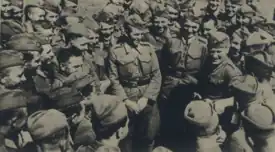Slovak Expeditionary Army Group
The Slovak Expeditionary Army Group was an element of the military forces of the Slovak Republic that fought under Nazi German command on the Eastern Front during World War II.
| Slovak Expeditionary Army Group | |
|---|---|
| Slovenská Armádna Skupina | |
 Members of the Slovak Expeditionary Army pictured in a propaganda photograph in October 1941. | |
| Active | September 1941 – June 1944 |
| Country | |
| Allegiance | |
| Branch | |
| Size | 45,000 |
| Engagements | World War II |
Background
The Slovak Republic was a puppet state established on 14 March 1939. It possessed a small army of its own, largely made up of parts inherited from the old Czechoslovak Army. The 1st Slovak Infantry Division took part in the German invasion of Poland in September 1939. In the aftermath of the German invasion of France, the German government consolidated its control of the Slovak regime.[1] On 21 June 1941, the Slovak government not informed about the invasion of Russia and offered to participate in the German invasion of the Soviet Union. Germany accepted the following day.[2] The Slovak Army was called up, as the regime sought to demonstrate its indispensability to Nazi Germany and its greater loyalty than Hungary.
History
The Slovak Expeditionary Army Group of about 45,000 men entered the Soviet Union shortly after the German attack. This army lacked logistic and transportation support, so a much smaller unit, the Slovak Mobile Command under command of Rudolf Pilfousek (a.k.a. the Pilfousek Brigade), was formed from units selected from this force; the rest of the Slovak army was relegated to rear-area security duty. The Slovak Mobile Command was attached to the German 17th Army (as was the Hungarian Carpathian Group also) and shortly thereafter given over to direct German command, the Slovaks lacking the command infrastructure to exercise effective operational control. This unit fought with the 17th Army through July 1941, including at the Battle of Uman and the Battle of Lypovec.
At the beginning of August 1941, the Slovak Mobile Command was dissolved and instead two infantry divisions were formed from the Slovak Expeditionary Army Group. The Slovak 2nd Division was a security division, but the Slovak 1st Division was a front-line unit which fought in the campaigns of 1941 and 1942, reaching the Caucasus area with Army Group B. The Slovak 1st Division then shared the fate of the German southern forces, losing its heavy equipment in the Kuban bridgehead and suffering heavy losses at Melitopol in the southern Ukraine.
Slovak troops took part in Operation Bamberg, an anti-partisan action in which 5,000 alleged partisans, including 200 Jews, were shot.[3] Slovak soldiers participated in numerous pogroms and frequently robbed Jews during the first days and weeks of the occupation in the summer of 1941. However, there was no equivalent of the Barbarossa decree (which authorized Wehrmacht soldiers to execute civilians without trial) and some Slovak soldiers were tried for robbing or murdering Jews, receiving only very light sentences. Many Slovak soldiers and the army leadership nevertheless approved of the Holocaust, due in part to the large amount of propaganda promoting the Jewish Bolshevik canard.[4]
In June 1944, the remnant of the division, no longer considered fit for combat due to low morale, was disarmed and the personnel assigned to construction and logistical work, a fate which had already befallen the Slovak 2nd Division earlier for the same reason.
Commanders of the 1st Mobile Infantry Division
- Augustín Malár (September 1941 – September 1942)
- Jozef Turanec (September 1942 – January 1943)
- Stefan Jurech (January 1943 – September 1943)[5]
- Elmir Lendvay (September 1943 – June 1944)[6]
References
- Rychlík 2018, pp. 121–2.
- Rychlík 2018, p. 122.
- Hutzelmann, Barbara (2018). "Einführung: Slowakei" [Introduction: Slovakia]. In Hutzelmann, Barbara; Hausleitner, Mariana; Hazan, Souzana (eds.). Slowakei, Rumänien und Bulgarien [Slovakia, Romania, and Bulgaria]. Die Verfolgung und Ermordung der europäischen Juden durch das nationalsozialistische Deutschland 1933-1945 [The Persecution and Murder of European Jews by Nazi Germany 1933-1945] (in German). Vol. 13. Munich: Institut für Zeitgeschichte. p. 39. ISBN 978-3-11-036500-9.
- Baka, Igor (2017). "Slovenská armáda a protižidovské pogromy na okupovanom území ZSSR v lete 1941" [The Slovak army and anti-Jewish pogroms in the occupied part of the USSR in 1941] (PDF). Historický časopis (in Slovak). 65 (4): 689–708. doi:10.31577/histcaso.2017.65.4.6. S2CID 199227689.
- Slovak heritage
- Feldgrau WW2 Slovakian Axis Forces
Bibliography
- Rychlík, Jan (2018). "Slovakia". In Stahel, David (ed.). Joining Hitler's Crusade: European Nations and the Invasion of the Soviet Union, 1941. Cambridge: Cambridge University Press. pp. 107–33. ISBN 978-1-316-51034-6.
Further reading
- Müller, Rolf-Dieter (2012). The Unknown Eastern Front: The Wehrmacht and Hitler's Foreign Soldiers. London: I.B.Tauris. ISBN 9781780768908.